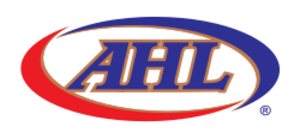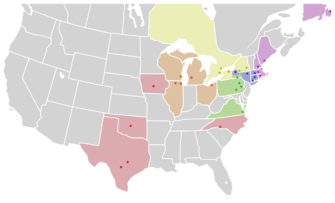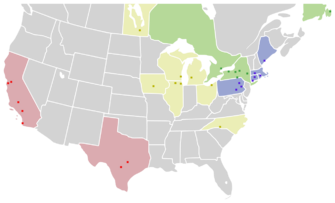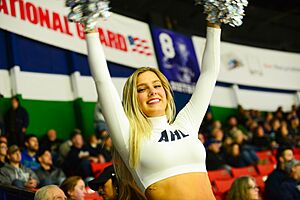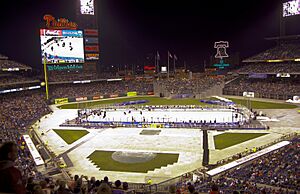American Hockey League facts for kids
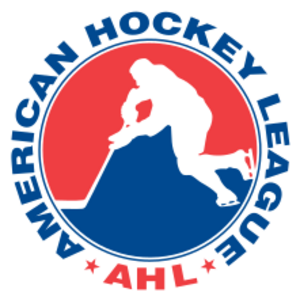
American Hockey League logo
|
|
| Sport | Ice hockey |
|---|---|
| Founded | 1936 (IHL/C-AHL Interlocking schedules); 1938 (IHL/C-AHL formally merged) |
| President | D. Scott Howson |
| No. of teams | 32 |
| Countries | United States (26 teams) Canada (6 teams) |
| Headquarters | Springfield, Massachusetts, U.S. |
| Most recent champion(s) |
Abbotsford Canucks (1st title) |
| Most titles | Hershey Bears (13 titles) |
| TV partner(s) | Canada (English): Sportsnet/Sportsnet One Canada (French): Réseau des sports Europe: Premier Sports United States (English): NHL Network, FloSports United States (Spanish): ESPN Deportes |
| Official website | theahl.com |
The American Hockey League (AHL) is a professional ice hockey league in North America. It's like a training ground for players who want to play in the National Hockey League (NHL). The league has 32 teams. Twenty-six teams are in the United States, and six are in Canada.
Every NHL team has a special connection with an AHL team. This means players can move between the two leagues. The main office for the AHL is in Springfield, Massachusetts. The current president is Scott Howson.
To play in the AHL, a player must be at least 18 years old. They also cannot be part of a junior hockey team. There's a rule about how many experienced players can be on a team during a game. Only five players (not goalies) can have played more than 260 professional games.
The team that wins the yearly playoffs gets the Calder Cup. This trophy is named after Frank Calder, who was the first president of the NHL. The Abbotsford Canucks are the current champions, winning their first Calder Cup.
Contents
AHL History: How It Started
The AHL began from two older hockey leagues. These were the Canadian-American Hockey League (Can-Am League) and the first International Hockey League. The Can-Am League started in 1926, and the International Hockey League began in 1929.
Early Days: Two Leagues Join Forces
By 1936, both leagues had only a few teams left. To survive, they decided to work together. They created a combined schedule and called themselves the International-American Hockey League (I-AHL). The teams from the Can-Am League formed the East Division. The teams from the International Hockey League became the West Division.
The I-AHL started with eight teams in November 1936. But one team, the Buffalo Bisons, had to stop playing in December 1936. This was because of money problems and not having a good arena. So, the league played with seven teams for a while.
At the end of the 1936–37 season, they created a new championship trophy. This was the Calder Cup. The Syracuse Stars won the very first Calder Cup. This trophy is still given out today to the AHL playoff champions.
Becoming the American Hockey League

After two seasons of playing together, the two leagues officially joined in 1938. They added an eighth team, the Hershey Bears. The Bears are the only team from that time that has played in the league every year since. In 1940, the I-AHL changed its name to the American Hockey League.
Tough Times and Growth
In the late 1960s and early 1970s, it became more expensive to run a hockey team. The NHL also grew, and a new league called the World Hockey Association (WHA) started. This meant more teams were competing for players, and player salaries went up.
Many AHL teams struggled financially. From 1974 to 1977, half of the AHL's teams closed down. The league was in danger of folding completely. However, things started to get better in 1977. The Philadelphia Flyers (an NHL team) decided to own an AHL team again. Also, another league, the North American Hockey League, suddenly closed.
This led to new teams joining the AHL. The Flyers' new team, the Maine Mariners, was very successful. Other teams from the closed league also joined. This helped the AHL grow steadily. By the 2000–01 season, the league had 20 teams.
More Teams Join the AHL
In 2001–02, the AHL grew a lot. Six teams from another league, the International Hockey League (IHL), joined the AHL. The IHL had financial problems and closed down. Many of these former IHL teams have since won the Calder Cup.
Teams Move Closer to NHL Partners
Starting in the 2015–16 season, many AHL teams moved. This happened because NHL teams wanted their AHL partners to be closer. It makes it easier to move players between the two leagues.
For example, five teams moved to California to form a new "Pacific Division." These teams were connected to NHL teams in the Pacific Division. Other teams also moved, like the St. John's IceCaps returning to Winnipeg as the Manitoba Moose.
More teams kept moving in the following years. The Springfield Falcons moved to become the Tucson Roadrunners. The Montreal Canadiens' team moved to Laval, Quebec, and became the Laval Rocket. The Ottawa Senators' team moved to Belleville, Ontario, and became the Belleville Senators.
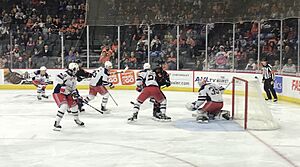
In 2018–19, the league added a 31st team, the Colorado Eagles. The NHL planned to add a 32nd team, the Seattle Kraken, in 2021. So, the AHL also approved a new team for Seattle, the Coachella Valley Firebirds.
In 2020, the San Antonio Rampage moved to Henderson, Nevada, and became the Henderson Silver Knights. In 2021, the Vancouver Canucks moved their team to Abbotsford. The Stockton Heat also moved to Calgary in 2022.
For the 2023–24 season, the Chicago Wolves were the only team without a direct NHL partner. However, the Carolina Hurricanes (an NHL team) loaned some players to the Wolves. In May 2024, the Hurricanes and Wolves agreed to work together for three years.
AHL Teams Today
The AHL has 32 teams, divided into two conferences: Eastern and Western. Each conference has different divisions.
List of Current AHL Teams
| Conference | Division | Team Name | City | Arena | Founded | Joined | Current city since | Head coach | NHL affiliate |
|---|---|---|---|---|---|---|---|---|---|
| Eastern | Atlantic | Bridgeport Islanders | Bridgeport, Connecticut | Total Mortgage Arena | 2001 | Rocky Thompson | New York Islanders | ||
| Charlotte Checkers | Charlotte, North Carolina | Bojangles Coliseum | 1990 | 2010 | Geordie Kinnear | Florida Panthers | |||
| Hartford Wolf Pack | Hartford, Connecticut | PeoplesBank Arena | 1926 | 1936 | 1997 | Grant Potulny | New York Rangers | ||
| Hershey Bears | Hershey, Pennsylvania | Giant Center | 1938 | Derek King | Washington Capitals | ||||
| Lehigh Valley Phantoms | Allentown, Pennsylvania | PPL Center | 1996 | 2014 | John Snowden | Philadelphia Flyers | |||
| Providence Bruins | Providence, Rhode Island | Amica Mutual Pavilion | 1987 | 1992 | Ryan Mougenel | Boston Bruins | |||
| Springfield Thunderbirds | Springfield, Massachusetts | MassMutual Center | 1975 | 1981 | 2016 | Steve Konowalchuk | St. Louis Blues | ||
| Wilkes-Barre/Scranton Penguins | Wilkes-Barre Township, Pennsylvania | Mohegan Arena at Casey Plaza | 1981 | 1999 | Kirk MacDonald | Pittsburgh Penguins | |||
| North | Belleville Senators | Belleville, Ontario | CAA Arena | 1972 | 2017 | David Bell | Ottawa Senators | ||
| Cleveland Monsters | Cleveland, Ohio | Rocket Arena | 1994 | 2001 | 2007 | Trent Vogelhuber | Columbus Blue Jackets | ||
| Laval Rocket | Laval, Quebec | Place Bell | 1969 | 2017 | Pascal Vincent | Montreal Canadiens | |||
| Rochester Americans | Rochester, New York | Blue Cross Arena | 1956 | Michael Leone | Buffalo Sabres | ||||
| Syracuse Crunch | Syracuse, New York | Upstate Medical University Arena | 1992 | 1994 | Joel Bouchard | Tampa Bay Lightning | |||
| Toronto Marlies | Toronto, Ontario | Coca-Cola Coliseum | 1978 | 2005 | John Gruden | Toronto Maple Leafs | |||
| Utica Comets | Utica, New York | Adirondack Bank Center | 1998 | 2013 | Ryan Parent | New Jersey Devils | |||
| Western | Central | Chicago Wolves | Rosemont, Illinois | Allstate Arena | 1994 | 2001 | Cam Abbott | Carolina Hurricanes | |
| Grand Rapids Griffins | Grand Rapids, Michigan | Van Andel Arena | 1996 | 2001 | Dan Watson | Detroit Red Wings | |||
| Iowa Wild | Des Moines, Iowa | Casey's Center | 1994 | 2001 | 2013 | Greg Cronin | Minnesota Wild | ||
| Manitoba Moose | Winnipeg, Manitoba | Canada Life Centre | 1994 | 2001 | Mark Morrison | Winnipeg Jets | |||
| Milwaukee Admirals | Milwaukee, Wisconsin | UW–Milwaukee Panther Arena | 1970 | 2001 | Karl Taylor | Nashville Predators | |||
| Rockford IceHogs | Rockford, Illinois | BMO Center | 1995 | 2007 | Jared Nightingale | Chicago Blackhawks | |||
| Texas Stars | Cedar Park, Texas | H-E-B Center at Cedar Park | 1999 | 2009 | Toby Petersen | Dallas Stars | |||
| Pacific | Abbotsford Canucks | Abbotsford, British Columbia | Abbotsford Centre | 1932 | 1936 | 2021 | Manny Malhotra | Vancouver Canucks | |
| Bakersfield Condors | Bakersfield, California | Dignity Health Arena | 1984 | 2015 | Colin Chaulk | Edmonton Oilers | |||
| Calgary Wranglers | Calgary, Alberta | Scotiabank Saddledome | 1977 | 2022 | Brett Sutter | Calgary Flames | |||
| Coachella Valley Firebirds | Thousand Palms, California | Acrisure Arena | 2022 | Derek Laxdal | Seattle Kraken | ||||
| Colorado Eagles | Loveland, Colorado | Blue Arena | 2018 | Mark Letestu | Colorado Avalanche | ||||
| Henderson Silver Knights | Henderson, Nevada | Lee's Family Forum | 1971 | 2020 | Ryan Craig | Vegas Golden Knights | |||
| Ontario Reign | Ontario, California | Toyota Arena | 2001 | 2015 | Andrew Lord | Los Angeles Kings | |||
| San Diego Gulls | San Diego, California | Pechanga Arena | 2000 | 2015 | Matt McIlvane | Anaheim Ducks | |||
| San Jose Barracuda | San Jose, California | Tech CU Arena | 1996 | 2015 | John McCarthy | San Jose Sharks | |||
| Tucson Roadrunners | Tucson, Arizona | Tucson Convention Center | 1994 | 2016 | Steve Potvin | Utah Mammoth | |||
AHL Team Timeline
This timeline shows when teams joined and left the AHL. A gold star means they won the Calder Cup.
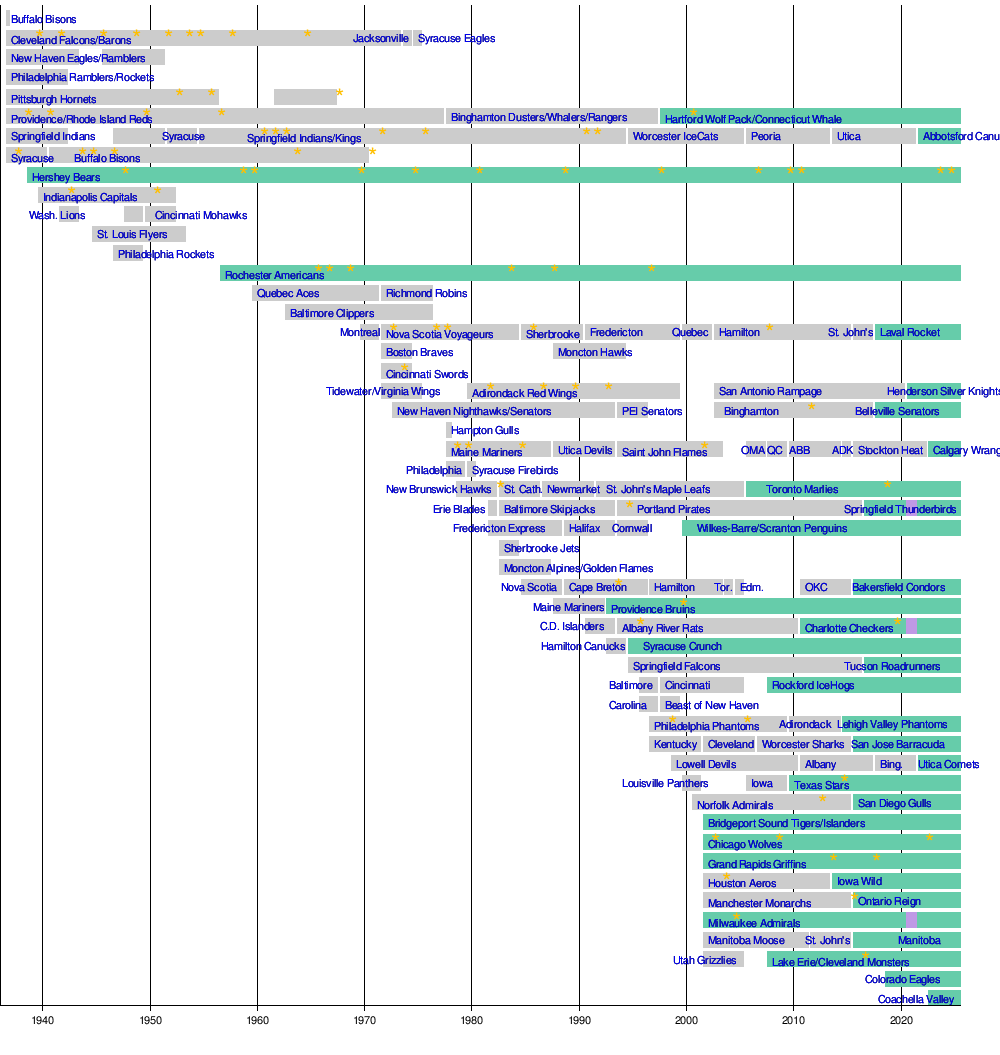
AHL Presidents: Who Leads the League?
The AHL has had several presidents who have guided the league. Here is a list of the people who have held this important role:
| Name | Tenure |
|---|---|
| Maurice Podoloff | 1936–1952 |
| Emory D. Jones | 1952–1953 |
| John B. Sollenberger | 1953–1954 |
| John D. Chick | 1954–1957 |
| Richard F. Canning | 1957–1961 |
| James G. Balmer | 1961–1964 |
| John T. Riley | 1964–1966 |
| Jack A. Butterfield | 1966–1994 |
| David A. Andrews | 1994–2020 |
| D. Scott Howson | 2020–present |
AHL All-Star Game: A Special Event
The AHL first held an All-Star Game in 1942. It was a fundraiser to help the Red Cross during World War II. Players from the Eastern Division played against players from the Western Division.
The game was not played again until 1954. Then it was held every year until 1960. In these games, a team of all-stars played against the team that won the Calder Cup.
The modern AHL All-Star Game started again in 1995. A skills competition was added in 1996. This two-day event is called the AHL All-Star Classic. For many years, Canadian players played against players from other countries.
In 2011, the format changed. The Eastern Conference All-Stars played against the Western Conference All-Stars. Since 2016, the All-Star Game has been a special tournament. Teams from the league's four divisions play a three-on-three round-robin. The top two teams then play in a final game.
The AHL All-Star Classic was postponed in 2021 and 2022 due to the COVID-19 pandemic. The Laval Rocket hosted the event in 2023.
| Date | Arena | City | Winner | Score | Runner-up |
|---|---|---|---|---|---|
| February 3, 1942 | Cleveland Arena | Cleveland, Ohio | East All-Stars | 5–4 | West All-Stars |
| October 27, 1954 | Hershey Sports Arena | Hershey, Pennsylvania | AHL All-Stars | 7–3 | Cleveland Barons |
| January 10, 1956 | Duquesne Gardens | Pittsburgh, Pennsylvania | AHL All-Stars | 4–4 | Pittsburgh Hornets |
| October 23, 1956 | Rhode Island Auditorium | Providence, Rhode Island | Providence Reds | 4–0 | AHL All-Stars |
| October 6, 1957 | Rochester Community War Memorial | Rochester, New York | AHL All-Stars | 5–2 | Cleveland Barons |
| January 15, 1959 | Hershey Sports Arena | Hershey, Pennsylvania | Hershey Bears | 5–2 | AHL All-Stars |
| December 10, 1959 | Eastern States Coliseum | West Springfield, Massachusetts | Springfield Indians | 8–3 | AHL All-Stars |
| January 17, 1995 | Providence Civic Center | Providence, Rhode Island | Canada | 6–4 | USA |
| January 16, 1996 | Hersheypark Arena | Hershey, Pennsylvania | USA | 6–5 | Canada |
| January 16, 1997 | Harbour Station | Saint John, New Brunswick | World | 3–2 (SO) | Canada |
| February 11, 1998 | Onondaga County War Memorial Arena | Syracuse, New York | Canada | 11–10 | PlanetUSA |
| January 25, 1999 | First Union Center | Philadelphia, Pennsylvania | PlanetUSA | 5–4 (SO) | Canada |
| January 17, 2000 | Blue Cross Arena | Rochester, New York | Canada | 8–3 | PlanetUSA |
| January 15, 2001 | First Union Arena at Casey Plaza | Wilkes-Barre, Pennsylvania | Canada | 11–10 | PlanetUSA |
| February 14, 2002 | Mile One Stadium | St. John's, Newfoundland and Labrador | Canada | 13–11 | PlanetUSA |
| February 3, 2003 | Cumberland County Civic Center | Portland, Maine | Canada | 10–7 | PlanetUSA |
| February 9, 2004 | Van Andel Arena | Grand Rapids, Michigan | Canada | 9–5 | PlanetUSA |
| February 14, 2005 | Verizon Wireless Arena | Manchester, New Hampshire | PlanetUSA | 5–4 | Canada |
| February 1, 2006 | MTS Centre | Winnipeg, Manitoba | Canada | 9–4 | PlanetUSA |
| January 29, 2007 | Ricoh Coliseum | Toronto, Ontario | PlanetUSA | 7–6 | Canada |
| January 28, 2008 | Broome County Veterans Memorial Arena | Binghamton, New York | Canada | 9–8 (SO) | PlanetUSA |
| January 26, 2009 | DCU Center | Worcester, Massachusetts | PlanetUSA | 14–11 | Canada |
| January 19, 2010 | Cumberland County Civic Center | Portland, Maine | Canada | 10–9 (SO) | PlanetUSA |
| January 31, 2011 | Giant Center | Hershey, Pennsylvania | East All-Stars | 11–8 | West All-Stars |
| January 30, 2012 | Boardwalk Hall | Atlantic City, New Jersey | West All-Stars | 8–7 (SO) | East All-Stars |
| January 28, 2013 | Dunkin' Donuts Center | Providence, Rhode Island | West All-Stars | 7–6 | East All-Stars |
| February 12, 2014 | Mile One Centre | St. John's, Newfoundland and Labrador | AHL All-Stars | 7–2 | Färjestad BK |
| January 26, 2015 | Utica Memorial Auditorium | Utica, New York | West All-Stars | 14–12 | East All-Stars |
| February 1, 2016 | Oncenter War Memorial Arena | Syracuse, New York | Round robin results: Pacific 0–1 North Central 2–1 Atlantic (SO) Central 4–2 North Pacific 1–2 Atlantic Central 4–6 Pacific Atlantic 4–1 North |
||
| Central Division | 4–0 | Atlantic Division | |||
| January 30, 2017 | PPL Center | Allentown, Pennsylvania | Round robin results: Central 1–2 Atlantic Pacific 3–6 North Central 2–1 North (SO) Pacific 1–6 Atlantic Pacific 3–5 Central North 0–2 Atlantic |
||
| Central Division | 1–0 (SO) | Atlantic Division | |||
| January 29, 2018 | Utica Memorial Auditorium | Utica, New York | Round robin results: Pacific 5–3 North Central 2–5 Atlantic Central 2–4 North Pacific 4–3 Atlantic Central 3–4 Pacific Atlantic 3–4 North |
||
| North Division | 1–0 | Pacific Division | |||
| January 28, 2019 | MassMutual Center | Springfield, Massachusetts | Round robin results: Central 1–3 Atlantic Pacific 4–2 North Central 2–4 North Pacific 2–5 Atlantic Central 5–3 Pacific North 4–1 Atlantic |
||
| North Division | 1–0 (SO) | Atlantic Division | |||
| January 27, 2020 | Toyota Arena | Ontario, California | Round robin results: North 5–6 Pacific (SO) Atlantic 1–3 Central North 5–6 Central Atlantic 3–2 Pacific Atlantic 5–2 North Central 4–5 Pacific (SO) |
||
| Atlantic Division | 3–1 | Central Division | |||
| February 6, 2023 | Place Bell | Laval, Quebec | Round robin results: North 2–2 Pacific (SO) Atlantic 4–3 Central (SO) North 2–2 Central (SO) Atlantic 2–6 Pacific Atlantic 3–2 North (SO) Central 2–5 Pacific |
||
| Pacific Division | 1–0 | Atlantic Division | |||
| February 5, 2024 | Tech CU Arena | San Jose, California | Round robin results: North 1–1 Pacific (SO) Central 4–1 Atlantic North 3–2 Central (SO) Atlantic 2–2 Pacific (SO) Atlantic 6–1 North Pacific 4–3 Central (SO) |
||
| Pacific Division | 3–2 | Atlantic Division | |||
| February 3, 2025 | Acrisure Arena | Thousand Palms, California | Round robin results: Pacific 3–2 North Central 3–0 Atlantic North 4–2 Central Atlantic 4–3 Pacific (SO) Atlantic 2–1 North Central 5–2 Pacific |
||
| Central Division | 2–1 (SO) | Atlantic Division | |||
| February 11, 2026 | BMO Center | Rockford, Illinois | |||
Outdoor Games: Hockey Under the Sky
Since the 2009–10 season, the AHL has hosted at least one outdoor hockey game each year. These games are played in large stadiums, often with huge crowds.
The Syracuse Crunch held the first AHL outdoor game in 2010. Over 21,500 fans watched the game. The Connecticut Whale hosted the second outdoor game in 2011, with even more fans.
In 2012, the Adirondack Phantoms played the Hershey Bears outdoors in Philadelphia. A record 45,653 fans watched this game! It was part of a big hockey event that also included NHL games.
Other outdoor games have been held in Canada and California. These special games bring a lot of excitement to the league.
International Games: Playing Around the World
AHL teams have also played against teams from other countries. The first recorded international games were in 1969. The Montreal Voyageurs played against the Canadian National Team.
During the 1970s and 1980s, Soviet Union club teams toured North America. They played exhibition games against AHL clubs. Before the 1980 Winter Olympics, the Adirondack Red Wings played against national teams from the United States, West Germany, Sweden, and Finland.
The Rochester Americans even played in the Spengler Cup in Switzerland in 1996 and 2013. This is a yearly tournament with teams from all over the world.
AHL Hall of Fame: Honoring Greats
The AHL started its own Hall of Fame in 2005. It was created to honor people who have made big contributions to the league.
AHL Trophies and Awards
The AHL gives out many trophies and awards each season. These awards recognize players, coaches, and teams for their great achievements.
Individual Awards
- Les Cunningham Award – Best player (MVP)
- John B. Sollenberger Trophy – Player with the most points
- Willie Marshall Award – Player with the most goals
- Dudley "Red" Garrett Memorial Award – Best rookie player
- Eddie Shore Award – Best defense player
- Aldege "Baz" Bastien Memorial Award – Best goalie
- Harry "Hap" Holmes Memorial Award – Goalie with the lowest goals against average
- Louis A.R. Pieri Memorial Award – Best coach
- Fred T. Hunt Memorial Award – For sportsmanship and determination
- Yanick Dupre Memorial Award – For community service
- Jack A. Butterfield Trophy – Best player in the playoffs (Playoff MVP)
Team Awards
- Calder Cup – Playoff champions
- Richard F. Canning Trophy – Eastern Conference playoff champions
- Robert W. Clarke Trophy – Western Conference playoff champions
- Macgregor Kilpatrick Trophy – Best team in the regular season (overall league)
- Frank Mathers Trophy – Best team in the Eastern Conference (regular season)
- Norman R. "Bud" Poile Trophy – Best team in the Western Conference (regular season)
- Emile Francis Trophy – Best team in the Atlantic Division (regular season)
- F. G. "Teddy" Oke Trophy – Best team in the North Division (regular season)
- Sam Pollock Trophy – Best team in the Central Division (regular season)
- John D. Chick Trophy – Best team in the Pacific Division (regular season)
Other Awards
- James C. Hendy Memorial Award – Best team executive
- Thomas Ebright Memorial Award – For outstanding career contributions to the AHL
- James H. Ellery Memorial Awards – For great media coverage
- Ken McKenzie Award – Best marketing executive
- Michael Condon Memorial Award – For outstanding service by an on-ice official
- President's Awards – Two awards given by the AHL president. One for a team's excellence off the ice, and one for a player's outstanding achievements.
See also
 In Spanish: American Hockey League para niños
In Spanish: American Hockey League para niños
 | Percy Lavon Julian |
 | Katherine Johnson |
 | George Washington Carver |
 | Annie Easley |


